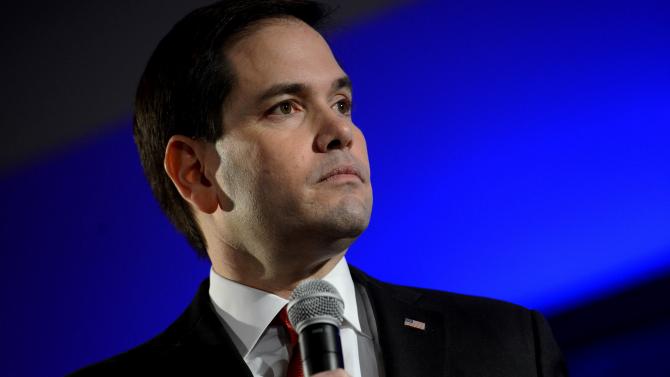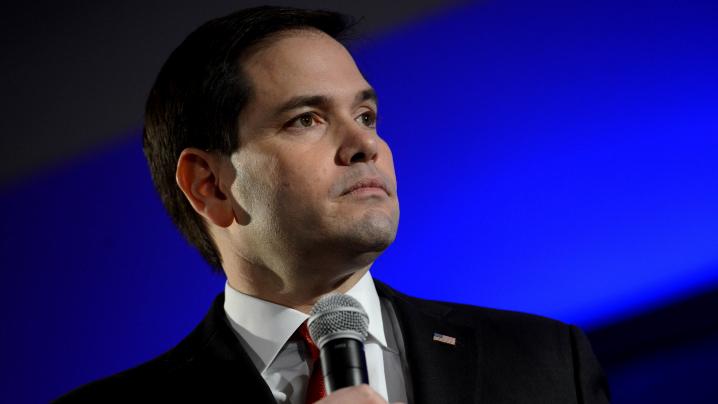[ad_1]

Republican presidential candidate Marco Rubio speaks at the New Hampshire Republican Party’s First in the Nation Presidential Town Hall Jan. 23, 2016, in Nashua, N.H.
Darren McCollester/Getty Images
Sen. Marco Rubio’s (R-Fla.) statements on the Black Lives Matter movement surprised many last year. But how far will he go in addressing the disparities in the criminal-justice system? The Root’s Meet the Candidates series continues its exploration of where presidential candidates stand on some of the most pressing issues for African Americans. Previously we discussed Bernie Sanders, Donald Trump and Hillary Clinton. Now let’s take a closer look at Rubio.
In August, Fox News apparently became concerned that Black Lives Matter activists would soon start targeting Republican campaign gatherings after protesters interrupted a Jeb Bush rally. The incident prompted Fox News host Megyn Kelly to ask GOP presidential candidates whether black lives matter or whether all lives matter. Rubio gave a response that seemed to surprise her.
“This is a legitimate issue,” Rubio said. “It is a fact that in the African-American community around this country, there has been, for a number of years now, a growing resentment towards the way law enforcement and the criminal-justice system interacts with the community.”
The former speaker of the Florida House of Representatives said “it is a serious problem” that young black men in some communities are more likely to wind up in the criminal-justice system than in college.
Rubio also shared with Kelly that even black professional men are often viewed as suspicious. He said that police officers had stopped a personal friend of his at least eight times in the past 18 months without giving him a ticket.
“I’d be upset about it. So would anybody else,” he added.
That said, criminal-justice reform is not a top agenda item for Rubio: It is notably absent from the list of issues on his campaign website.
Rubio’s essay contribution to the Brennan Center for Justice’s book on criminal-justice reform, however, offers a glimpse into his thinking. While acknowledging the growing bipartisan consensus about criminal-justice reform and a need for a “spirited conversation” about reform, the candidate laments that “too often that conversation starts and ends with drug policy.” He urges caution about reducing drug-conviction sentences, in order to avoid a return to the consequences of the narcotics plague that began in the 1980s.
Rubio does see a need for reform, but he wants to focus more on “cataloguing crimes and weeding out unnecessary laws,” as the Washington Post observes.
On the issue of gun rights, Rubio states that the Second Amendment, at its core, “is about the American Dream,” and he vows to protect the right to own a weapon. His solution to mass shootings is to shift the focus of the debate from guns to mental illness and the pervasiveness of violence in our society. He has said that none of the proposed gun control measures would have prevented mass killings.
Rubio is in tune with other Republicans who support voter-ID laws that most Democrats view as a method to discourage voter participation among minorities and the poor.
In the wake of the devastating recession, families are now trying to climb out of the economic pit. To those on the lowest rung, Rubio acknowledges that their wages are too meager—but he rejects giving them a raise. Like his GOP rivals, the senator opposes a minimum wage hike. Instead, Rubio wants to promote policies that encourage business ownership and new-job creation.
“I have the full confidence that the American private sector, made up of the most innovative and productive people on this planet, won’t just create millions of jobs; they will create millions of jobs that pay more,” he said last year.
On student-loan debt, Rubio says that he understands the pain. He graduated from law school in 1996 more than $100,000 in debt. The future politician landed a job at a law firm that paid $50,000 a year—which was more than his parents earned but hardly enough to cover monthly student-loan payments and move out of his parents’ house.
But if Rubio is elected, don’t expect him to pursue free tuition at public universities. He would instead establish income-based repayment of federal loans as the default system. Under the IBR system, which President Barack Obama has also championed, those who have high incomes make higher payments and pay off their loans more quickly than those earning lower salaries.
As for access to health care, Rubio wants to get rid of Obamacare. His alternative includes providing refundable tax credits and promoting health savings accounts. He would also create high-risk pools for those with pre-existing conditions and permit people to purchase health insurance across state lines.
Previously in the Meet the Candidates series:
“Should You ‘Feel the Bern’? Where Bernie Sanders Stands on the Issues”
“Donald Trump Says He’ll Win the Black Vote, but How? Where Trump Stands on the Issues”
“She Has Black Support, but Can She Keep It? Where Hillary Clinton Stands on the Issues”
Up next in Meet the Candidates: A closer look at Ben Carson.
Nigel Roberts is a New York City-based freelance writer. Follow him on Twitter.
Like The Root on Facebook. Follow us on Twitter.
[ad_2]





















